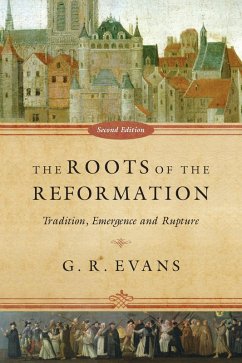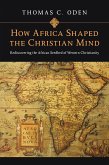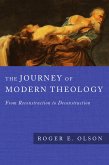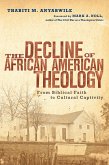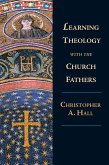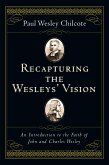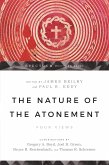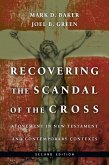28,57 €
inkl. MwSt.
Sofort per Download lieferbar
- Format: ePub
- Merkliste
- Auf die Merkliste
- Bewerten Bewerten
- Teilen
- Produkt teilen
- Produkterinnerung
- Produkterinnerung

Bitte loggen Sie sich zunächst in Ihr Kundenkonto ein oder registrieren Sie sich bei
bücher.de, um das eBook-Abo tolino select nutzen zu können.
Hier können Sie sich einloggen
Hier können Sie sich einloggen
Sie sind bereits eingeloggt. Klicken Sie auf 2. tolino select Abo, um fortzufahren.

Bitte loggen Sie sich zunächst in Ihr Kundenkonto ein oder registrieren Sie sich bei bücher.de, um das eBook-Abo tolino select nutzen zu können.
Renowned historian G. R. Evans revisits the question of what happened at the Reformation. Contravening traditional paradigms of interpretation, Evans charts the controversies and challenges that roiled the era of the Reformation and argues that these are really part of a much longer history of discussion and disputation. Evans takes up several issues, such as Scripture, ecclesiology, authority, sacraments and ecclesio-political relations, and traces the shape of the charged discussions that orbited around these through the patristic, medieval and Reformation eras. In this, she demonstrates…mehr
- Geräte: eReader
- ohne Kopierschutz
- eBook Hilfe
- Größe: 1.1MB
- Upload möglich
Andere Kunden interessierten sich auch für
![How Africa Shaped the Christian Mind (eBook, ePUB) How Africa Shaped the Christian Mind (eBook, ePUB)]() Thomas C. OdenHow Africa Shaped the Christian Mind (eBook, ePUB)23,96 €
Thomas C. OdenHow Africa Shaped the Christian Mind (eBook, ePUB)23,96 €![The Journey of Modern Theology (eBook, ePUB) The Journey of Modern Theology (eBook, ePUB)]() Roger E. OlsonThe Journey of Modern Theology (eBook, ePUB)56,24 €
Roger E. OlsonThe Journey of Modern Theology (eBook, ePUB)56,24 €![The Decline of African American Theology (eBook, ePUB) The Decline of African American Theology (eBook, ePUB)]() Thabiti M. AnyabwileThe Decline of African American Theology (eBook, ePUB)28,14 €
Thabiti M. AnyabwileThe Decline of African American Theology (eBook, ePUB)28,14 €![Learning Theology with the Church Fathers (eBook, ePUB) Learning Theology with the Church Fathers (eBook, ePUB)]() Christopher A. HallLearning Theology with the Church Fathers (eBook, ePUB)28,57 €
Christopher A. HallLearning Theology with the Church Fathers (eBook, ePUB)28,57 €![Recapturing the Wesleys' Vision (eBook, ePUB) Recapturing the Wesleys' Vision (eBook, ePUB)]() Paul Wesley ChilcoteRecapturing the Wesleys' Vision (eBook, ePUB)19,35 €
Paul Wesley ChilcoteRecapturing the Wesleys' Vision (eBook, ePUB)19,35 €![The Nature of the Atonement (eBook, ePUB) The Nature of the Atonement (eBook, ePUB)]() The Nature of the Atonement (eBook, ePUB)26,73 €
The Nature of the Atonement (eBook, ePUB)26,73 €![Recovering the Scandal of the Cross (eBook, ePUB) Recovering the Scandal of the Cross (eBook, ePUB)]() Mark D. BakerRecovering the Scandal of the Cross (eBook, ePUB)30,42 €
Mark D. BakerRecovering the Scandal of the Cross (eBook, ePUB)30,42 €-
-
-
Renowned historian G. R. Evans revisits the question of what happened at the Reformation. Contravening traditional paradigms of interpretation, Evans charts the controversies and challenges that roiled the era of the Reformation and argues that these are really part of a much longer history of discussion and disputation. Evans takes up several issues, such as Scripture, ecclesiology, authority, sacraments and ecclesio-political relations, and traces the shape of the charged discussions that orbited around these through the patristic, medieval and Reformation eras. In this, she demonstrates that in many ways the Reformation was in considerable continuity with the periods that preceded it, though the consequential outcome of the debates in the sixteenth century was dramatically different.
Produktdetails
- Produktdetails
- Verlag: IVP Academic
- Seitenzahl: 480
- Erscheinungstermin: 2. August 2012
- Englisch
- ISBN-13: 9780830863310
- Artikelnr.: 44830753
- Verlag: IVP Academic
- Seitenzahl: 480
- Erscheinungstermin: 2. August 2012
- Englisch
- ISBN-13: 9780830863310
- Artikelnr.: 44830753
G. R. Evans is professor of medieval theology and intellectual history at the University of Cambridge and was British Academy Research Reader in Theology from 1986 to 1988. She has written on a wide range of medieval authors including Augustine, Gregory the Great, Anselm, Bernard of Clairvaux and Alan of Lille. She has also written The Language and Logic of the Bible (Cambridge University Press) and Faith in the Medieval World (InterVarsity Press).
Preface Acknowledgments Abbreviations 1. Setting the Scene: The "Fair Field of Folk" Part 1: Bible and Church: The Questions Begin 2. The Idea of Church A New Idea The Emergence of Ministers as Leaders Local Churches and the Universal Church 3. The Idea of Faith What Do We Believe? Trying to Put the Faith in a Nutshell One Faith and Different Rites 4. Where Was the Bible? Adding to the Old Testament Creating a Standard Text of the Bible for Use in the West The Ministry of the Word in the Early Church Finding Many Meanings in Scripture 5. Becoming and Remaining a Member of the Church The Doctrine of Baptism Emerges Insiders and Outsiders: Cyprian and the Rigorist Approach to the Problem of Apostasy 6. Penance and the Recurring Problem of Sin 7. The Eucharist and the Idea of Sacraments Eucharist Sacraments 8. Organization, Making Decisions and Keeping Together Councils and Other Ways of Making Decisions The Fifteenth-Century Bid for Conciliarism Instead of Primatial Government of the Church 9. The Church and the State The Two Swords The Body Politic, the City, the Corporation and the Church Titles and Benefices and the Growing Problem of the Church's Wealth Part 2: Continuity and Change in the Middle Ages 10. Monastic Life, Monastic Education and Awakening Social Concerns Guibert of Nogent: Monk and Social Commentator Monasteries as Powerhouses of Education 11. The Beginning of Academic Theology and the Invention of Universities The Invention of Universities Bible Study and the Beginning of Academic Theology 12. The Evangelical Urge and the Wandering Preachers Preaching Becomes Popular Again The Formal Rhetorical Art of Preaching The Franciscans and the Dominicans 13. Religious Experiments by the Laity Working People, Active Orders Exemplary Individuals and Being an Example to Others Glimpses of Ordinary Lives: Learning What to Believe and How to Live The Church Fosters the Mixed Life 14. Rebels, Dissidents and Repression Social Comment and the Debate About Poverty John Wyclif 15. Popular Preaching and the Bible in the Later Middle Ages Wycliffites, Lollards and the English Bible Lollard Preaching and the Bible Part 3: Continuity and Change from the Reformation 16. Renaissance The Rediscovery of the Greek and Hebrew Scriptures The Biblical Languages and the Universities Humanism or Scholasticism: The Two Ways 17. Luther and His Heirs: The Moderate Reformers The Conversion of Martin Luther and Its Consequences Melanchthon, Moderation and Building a Bridge Between the Academic and the Popular Creating a Lutheran Doctrinal System 18. Henry VIII and English Lutheranism 19. Peaceful Extremists? The Anabaptist Heirs of the Waldensians Huldreich Zwingli and the Battle with the Anabaptists Lutheran "Good Citizens" and Anabaptist "Anarchy" 20. Calvin and His Heirs: The Puritan Reformers John Calvin France, Huguenots and Some Notable Women John Knox and Scotland The English Reformation Turns Calvinist Puritans Leave for the New World 21. The Counter-Reformation Responding to the Challenge: Reforming Moves in Rome Science and the Bible from a Roman Catholic Perspective 22. Church and State Again: New Political Dimensions of the Idea of Order 23. Bible Questions Continue Taking a Stand on the King James Version? The Bible in Use: Private Reading and Personal Opinions Bible Commentary in Preaching and Teaching Polyglot Bibles Translation Theory Moves On Conclusion Handlist of Reformation Concerns and Their History Bibliography Author Index Subject Index Scripture Index
Preface Acknowledgments Abbreviations 1. Setting the Scene: The "Fair Field of Folk" Part 1: Bible and Church: The Questions Begin 2. The Idea of Church A New Idea The Emergence of Ministers as Leaders Local Churches and the Universal Church 3. The Idea of Faith What Do We Believe? Trying to Put the Faith in a Nutshell One Faith and Different Rites 4. Where Was the Bible? Adding to the Old Testament Creating a Standard Text of the Bible for Use in the West The Ministry of the Word in the Early Church Finding Many Meanings in Scripture 5. Becoming and Remaining a Member of the Church The Doctrine of Baptism Emerges Insiders and Outsiders: Cyprian and the Rigorist Approach to the Problem of Apostasy 6. Penance and the Recurring Problem of Sin 7. The Eucharist and the Idea of Sacraments Eucharist Sacraments 8. Organization, Making Decisions and Keeping Together Councils and Other Ways of Making Decisions The Fifteenth-Century Bid for Conciliarism Instead of Primatial Government of the Church 9. The Church and the State The Two Swords The Body Politic, the City, the Corporation and the Church Titles and Benefices and the Growing Problem of the Church's Wealth Part 2: Continuity and Change in the Middle Ages 10. Monastic Life, Monastic Education and Awakening Social Concerns Guibert of Nogent: Monk and Social Commentator Monasteries as Powerhouses of Education 11. The Beginning of Academic Theology and the Invention of Universities The Invention of Universities Bible Study and the Beginning of Academic Theology 12. The Evangelical Urge and the Wandering Preachers Preaching Becomes Popular Again The Formal Rhetorical Art of Preaching The Franciscans and the Dominicans 13. Religious Experiments by the Laity Working People, Active Orders Exemplary Individuals and Being an Example to Others Glimpses of Ordinary Lives: Learning What to Believe and How to Live The Church Fosters the Mixed Life 14. Rebels, Dissidents and Repression Social Comment and the Debate About Poverty John Wyclif 15. Popular Preaching and the Bible in the Later Middle Ages Wycliffites, Lollards and the English Bible Lollard Preaching and the Bible Part 3: Continuity and Change from the Reformation 16. Renaissance The Rediscovery of the Greek and Hebrew Scriptures The Biblical Languages and the Universities Humanism or Scholasticism: The Two Ways 17. Luther and His Heirs: The Moderate Reformers The Conversion of Martin Luther and Its Consequences Melanchthon, Moderation and Building a Bridge Between the Academic and the Popular Creating a Lutheran Doctrinal System 18. Henry VIII and English Lutheranism 19. Peaceful Extremists? The Anabaptist Heirs of the Waldensians Huldreich Zwingli and the Battle with the Anabaptists Lutheran "Good Citizens" and Anabaptist "Anarchy" 20. Calvin and His Heirs: The Puritan Reformers John Calvin France, Huguenots and Some Notable Women John Knox and Scotland The English Reformation Turns Calvinist Puritans Leave for the New World 21. The Counter-Reformation Responding to the Challenge: Reforming Moves in Rome Science and the Bible from a Roman Catholic Perspective 22. Church and State Again: New Political Dimensions of the Idea of Order 23. Bible Questions Continue Taking a Stand on the King James Version? The Bible in Use: Private Reading and Personal Opinions Bible Commentary in Preaching and Teaching Polyglot Bibles Translation Theory Moves On Conclusion Handlist of Reformation Concerns and Their History Bibliography Author Index Subject Index Scripture Index
